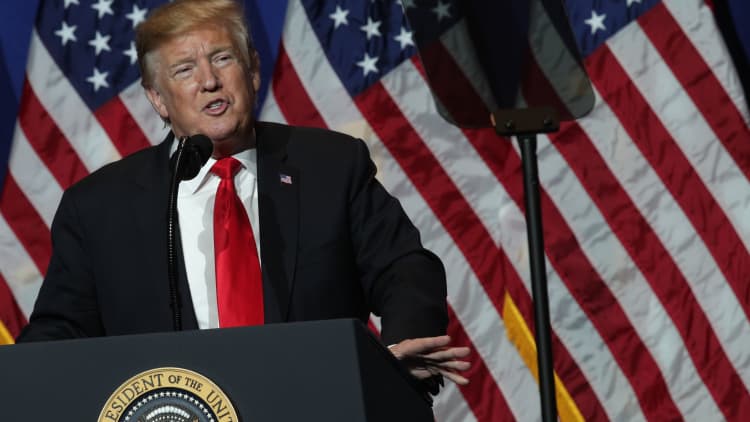Manufacturing had been one of the big winners during the Trump administration, but the surge appears to have stalled and tariffs could be at least partly to blame.
Recent readings for the sector show activity falling well off the hot pace it had shown for most of 2018. The Institute for Supply Management gauge indicated plans that were barely expansionary, while the global Markit Purchase Managers Index pointed to contraction.
While those measures could change direction once the tariff issue is settled, current conditions show that one of the key pillars in the Trump expansion is starting to wobble.

"The Trump bump to manufacturing in the US which takes place in many swing states has already petered out," Binky Chadha, chief strategist at Deutsche Bank, said in a research note. "In our view, a continued decline and in particular a falling below 50 will be hard to spin as anything but a manufacturing recession."
The ISM reading for May came in at 52.1, essentially a percentage reading representing manufacturers who plan to increase activity. That means a reading under 50 means more companies are planning to decrease activity.
The index rose from 51.8 when Trump took office up to a peak of 60.8 in August 2018 during a year in which U.S. GDP increased nearly 3% and posted some of the strongest levels of activity since the recovery began in mid-2009. However, a prolonged battle with China over trade, and the threat of a second front with Mexico that was eased over the weekend, took its toll on manufacturing.
Multiple ISM respondents said tariffs were crimping business.
An executive in food, beverage and tobacco products said tariffs "are having a significant impact on the cost of goods," while one in chemical products noted that the levies have "forced a change in our supply chain strategy." A respondent in plastics and rubber products said duties in Chinese imports "pose an issue on a number of chemicals and materials that are solely produced in China."
On the global front, the Markit PMI gauge for manufacturing dropped to 49.8 in May, the lowest reading since October 2012 and the first sub-50 print since February 2016.
Manufacturing had been sluggish for most of the recovery but finally gained some footing after President Donald Trump's election in November 2016.
In addition to the strengthening ISM trends, the sector had seen solid growth in jobs — some 498,000 since the election, or nearly half the 1.1 million total during the recovery — but just 13,000 through the first five months of 2019.
Should the sector continue to weaken, Chadha said, that could cause a walk-back in Trump's trade rhetoric. Chadha said the president has amped up the tariff talk during periods when the stock market has showed strength, then scaled back the tough talk on weakness.
"So even if there is a put, it is not a very effective one. In our view, a more likely and imminent trigger for sustained de-escalation is the state of US manufacturing, where the Trump-bump to the ISM has already been wiped out, and prospects are for continued declines, taking it to recession levels," Chadha wrote.
A palpable retreat in manufacturing would "change the narrative" on trade, as would a marked declined in Trump's approval writing, the strategist added.
One other aspect Chadha advised investors to watch is Trump's criticism of the Federal Reserve.
The president has repeatedly called on the central bank to cut rates, most recently during an impromptu interview Monday morning with CNBC.
Chada said Trump's anti-Fed tweets have occurred before tariff escalations, particularly in April just before the recent increase in China levies.


